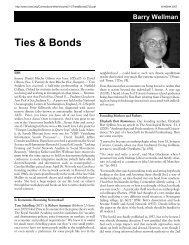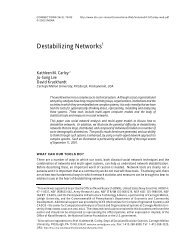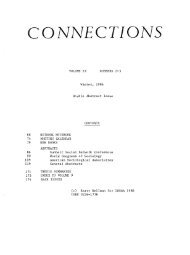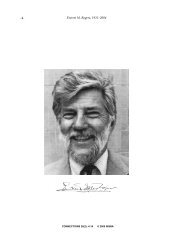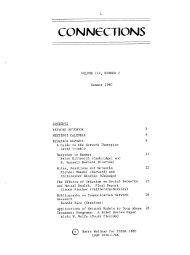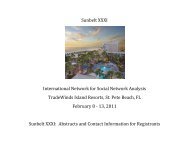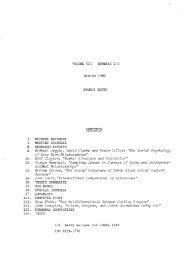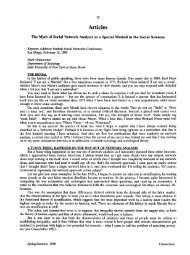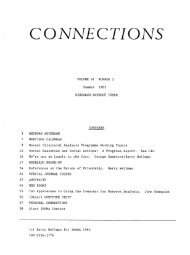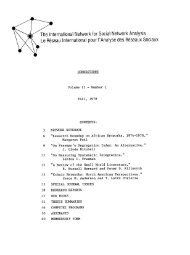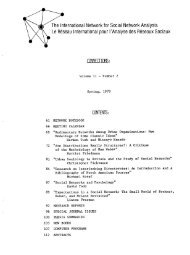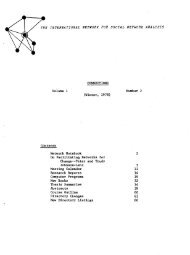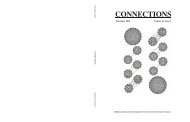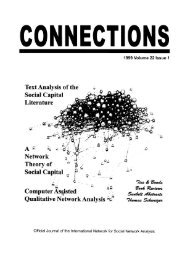(1990). Ties and Bonds. Connections, 13 (3) - INSNA
(1990). Ties and Bonds. Connections, 13 (3) - INSNA
(1990). Ties and Bonds. Connections, 13 (3) - INSNA
Create successful ePaper yourself
Turn your PDF publications into a flip-book with our unique Google optimized e-Paper software.
47<br />
theory, which today seems to be the mainstream within the direct investment theory, gives quite different results<br />
compared to using an interorganizational, network-oriented approach to the acquisition phenomenon .<br />
Friedkin, Noah E. (<strong>1990</strong>) . SNAPS (Social Network Analysis Procedures) for GAUSS. Social Networks, 12, 173-178.<br />
It is annoying to have to employ a variety of software programs in order to conduct research on networks . It is<br />
even more annoying to have to employ a different combination of programs for each new research project that is<br />
pursued . SNAPS for GAUSS is a response to these annoyances . GAUSS is host for SNAPS . The goal of SNAPS<br />
for GAUSS is to provide an integrated environment in which to conduct general mathematical/statistical investigations<br />
<strong>and</strong> social network analyses . Version 1 .0 of SNAPS represents a first step toward this goal .<br />
Friedkin, Noah E ., & Cook, Karen S . (<strong>1990</strong>) . Peer Group Influence. Sociological Methods <strong>and</strong> Research, 19,<br />
122-143 .<br />
This article evaluates three models of peer group influence on opinions . Two of these models are eliminated<br />
on theoretical <strong>and</strong> empirical grounds . The surviving model is consistent with the seminal work of French (1956) of<br />
social influence processes <strong>and</strong> provides theoretical foundations for the convention of measuring interpersonal effects<br />
with the mean opinion of an individual's set of peers. The model clearly points out the danger of reifying the<br />
mean of peer's opinions . Whether or not there is a group norm, the mean of peers' opinions must be viewed strictly<br />
as an analytical construction that may be employed to estimate the magnitude of pressures toward uniformity in a<br />
peer group .<br />
Fuller, Bruce, Garnier, Maurice, & Hage, Jerald . (<strong>1990</strong>) . State action <strong>and</strong> labor structure change in Mexico .<br />
Social Forces, 68, 1165-1189 .<br />
Third World "development" often is characterized by rapid growth in trade <strong>and</strong> service jobs, not in manufacturing<br />
employment . Prior explanations emphasize materialist conceptions : a widening division of (white-collar)<br />
labor is required to match technological complexity . Or the central state pushes investment of capital-intensive<br />
industry, <strong>and</strong> resulting urban immigration outpaces growth in labor dem<strong>and</strong> . This article focuses on how the central<br />
state's penetration into rural hinterl<strong>and</strong>s sparks growth in trade <strong>and</strong> service jobs . The Mexican state not only<br />
employed rising numbers of service workers; it also legitimated socially constructed forms of work, urbanlike<br />
knowledge <strong>and</strong> forms of status . We find that variation in state penetration across 299 rural <strong>and</strong> urban counties,<br />
especially the sanctioning of written literacy <strong>and</strong> mass schooling, is related to growth in white-collar <strong>and</strong> informalsector<br />
jobs (1900-1940), net the influence of counties' wealth <strong>and</strong> demographic features .<br />
Furlong, Mary S . (1989) . An electronic community for older adults : the SeniorNet network . Journal of<br />
Communication, 39, x-x.<br />
From grief counseling to organizing an on-line "seniors march" on health coverage, computers have given<br />
older adults a way to participate in contemporary culture while acquiring a new network of emotional peer support .<br />
Gidengil, Elisabeth . (<strong>1990</strong>) . Centres <strong>and</strong> peripheries : The political culture of dependency . C<strong>and</strong>ian Review of<br />
Sociology <strong>and</strong> Anthropology, 27, x-x.<br />
This study relates variations in Canadians' feelings of external political efficacy to their region's location in the<br />
centre- periphery system. In Canada's peripheral regions, the lack of autonomy that is the hallmark of dependency<br />
is reflected in residents' perceptions that little can be done to influence the political process . Francophone Quebec<br />
is shown to be distinctive in the lack of impact of even an advantaged regional location on perceptions of government<br />
responsiveness. A variety of ordinal loglinear models are developed to examine the impact of social class <strong>and</strong><br />
province . The study points to important variations in feelings of external efficacy within the provinces .<br />
Gill, Alison M . (<strong>1990</strong>) . Friendship formation in a new coal- mining town: Planning implications . Social Science<br />
Research, 74, 103ff.<br />
Friendship formation is examined in the context of a new mining town in British Columbia, Canada . A survey<br />
of residents reveals that the work environment provides an important basis for friendship formation in both direct<br />
<strong>and</strong> indirect ways (i.e, common work locations) . The nature of work in a resource town is distinctive, with many<br />
workers operating on shift systems <strong>and</strong> a high labor turnover rate . In the planning of the study community of<br />
Tumbler Ridge, much effort went into considering the social elements necessary for successful community development<br />
but, in the absence of an adequate underst<strong>and</strong>ing of social interaction in a resource town setting, the social<br />
linkages between the corporate environment <strong>and</strong> the community were not well-conceived .<br />
Fall/Winter <strong>1990</strong><br />
<strong>Connections</strong>



